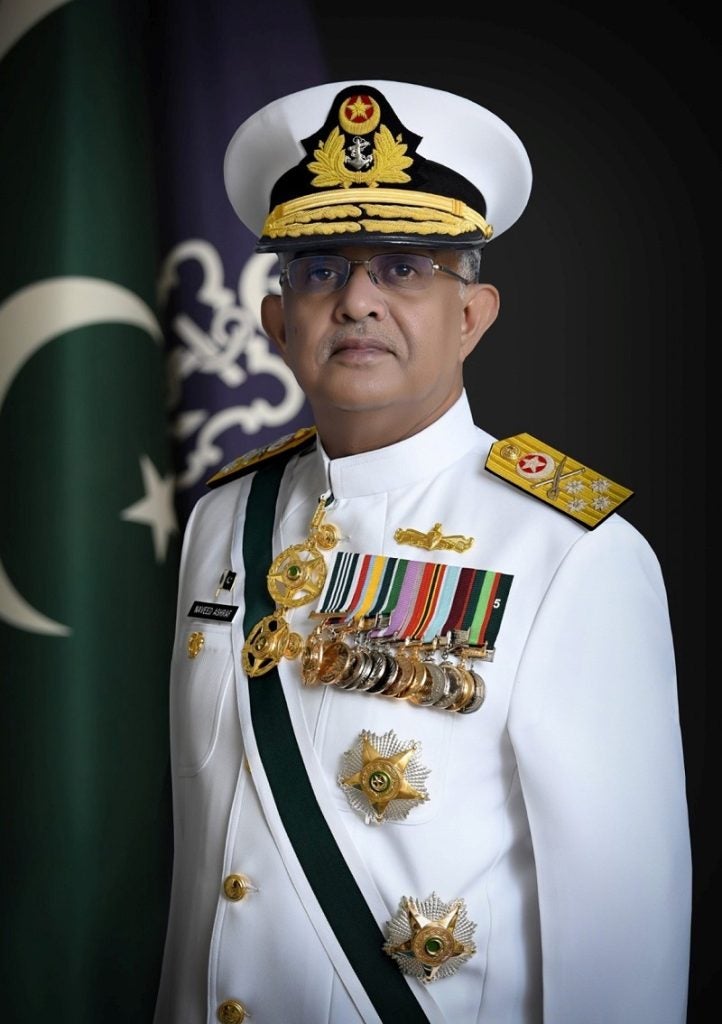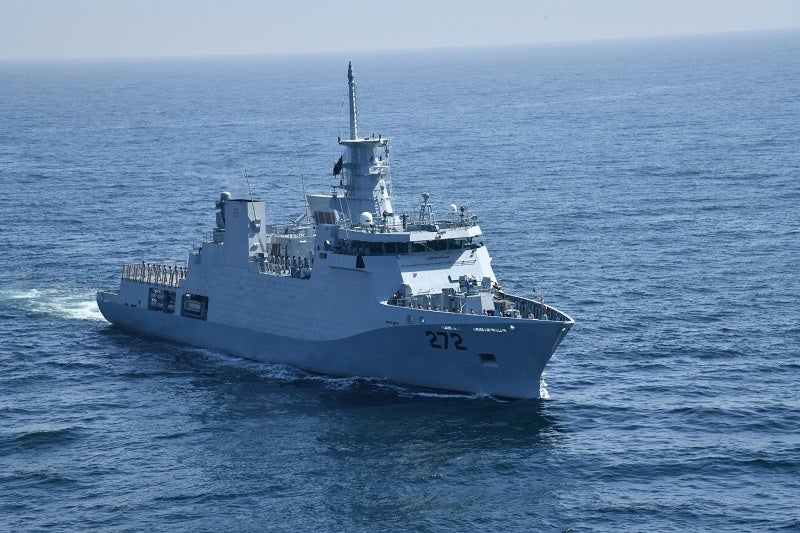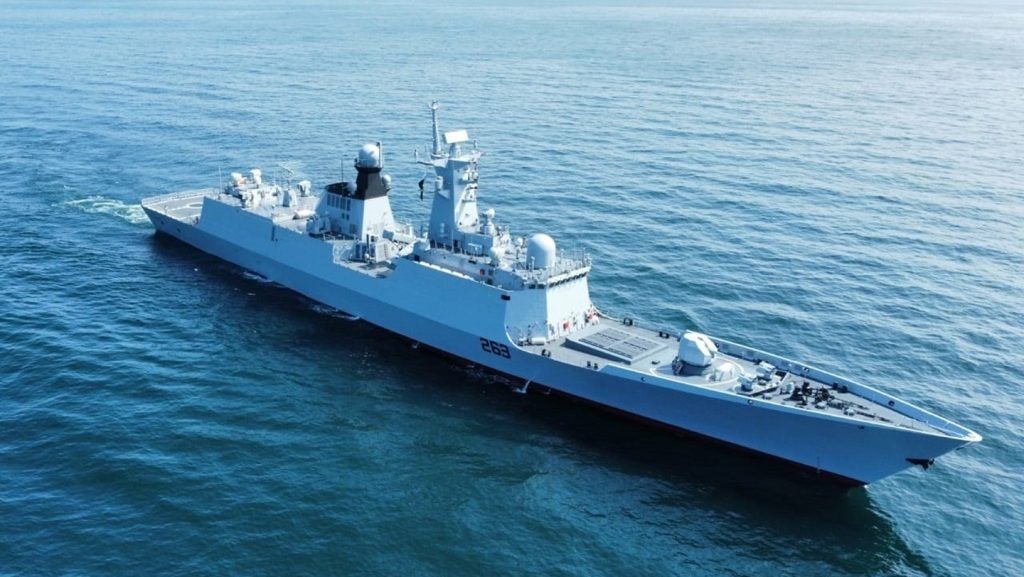Naval forces from around the world are gearing up for AMAN 2025, a multilateral exercise in the Arabian Sea hosted by the Pakistan Navy every two years, as well as the AMAN Dialogue onshore in Karachi.
These two events serve as an instrument for closer maritime cooperation. Pakistan’s Chief of Naval Staff (CNS), Admiral Naveed Ashraf, spoke to Naval Technology to discuss the principles underlying this joint effort for regional and global security.
Pakistan is positioning itself as a maritime player – not only as a leader of maritime security, but also in the defence industry as the country looks to expand its capabilities.
Pakistan’s defence acquisition budget is forecast to register a compound annual growth rate of 11.4% over the next four years: it is projected to reach $3.1bn in 2029 from $2bn in 2025 according to GlobalData intelligence.
This correlates with the Navy’s future plans, which the CNS also touched on as the service aims to indigenise the construction of large-scale warships and to mitigate external dependencies.

John Hill (JH): Can you introduce Exercise AMAN and the AMAN Dialogue?
CNS: The main objective of AMAN is to foster regional cooperation for maintenance of good order at sea, improving interoperability, share experiences, understand each other, and exhibit united resolve against terrorism and organised crimes in the maritime domain.
The Pakistan Navy is fully prepared and geared up to conduct AMAN-25 with enhanced participation of friendly countries in a professional and befitting manner.
Exercise AMAN has come a long way from its inception in 2007 wherein 28 countries participated. I may mention that a previous edition of the exercise, held in February 2023, witnessed the participation from 50 countries across the globe.
Keeping the same spirit, we are hopeful that this edition will also mark a distinctive chapter in history of AMAN exercises with enhanced participation of friendly countries.
Moreover, we are also looking forward to a healthy participation of Chiefs of Navies, Coast Guards, and Defence Forces during the AMAN Dialogue.
All major Pakistan Navy combatants – air arms and marine elements – will participate in the exercise.
JH: Can you lay out the Pakistan Navy’s stance on collaborative maritime security?
CNS: The Pakistan Navy has a long and successful tradition in cooperating with international partners. We believe that the magnitude and diversity of threats and challenges in our region is such that no country has the wherewithal to tackle them alone.
Therefore, collaborative maritime security has become an imperative for ensuring maritime security in the region. Our key principle is to keep the maritime environment safe against non-traditional threats and effectively contribute towards safety and security of vital sea lanes in the Arabian Sea, to our best abilities, despite being a moderate navy.
There is no second opinion on the fact that intensifying naval cooperation with other navies will help ensure maritime security in the Arabian Sea and adjacent regions.
Pakistan Navy contributions in the Combined Task Force (CTF)-150, CTF-151, conduct of Regional Maritime Security Patrols, and regular paritcipation in bi/tri-lateral events such as Exercise AMAN, AMAN Dialogue, all point in the same direction.

JH: What areas of modernisation will the Pakistan Navy focus on developing for a new era of strategic competition over the next decade or two?
CNS: Indigenisation and modernisation of the Pakistan Navy is an important cardinal of my vision.
Our development strategy is based on ‘progressive capability enhancement’ so as to create a balanced, potent, and combat ready force to deal with the evolving threats through acquisition of force multipliers, indigenous, and innovative technical solutions.
We have been focusing on the induction of modern platforms, force multipliers, indigenisation, and maintaining diversified options to mitigate external dependencies. At the same time, we believe in making best use of available resources. Recently, we have inducted Type 054 A/P frigates from China, Offshore Patrol Vessels Batch-I and Batch-II from Romania and MILGEM-class corvette from Türkiye.
These platforms with the latest weapons and sensors will be a signifcant addition to the Pakistan Navy’s existing capabilities to effectively deal with today’s complex multi-threat environment. The Navy is in the process of inducting the remaining MILGEM-class ships as two of these vessels are being constructed indigenously at Pakistan (KS&EW).
Based on experience gained during the construction of MILGEM-class ships, the Pakistan Navy is planning to build Jinnah-class frigates.
JH: What is the current status of the Jinnah-class frigate programme?
CNS: The Jinnah-class frigate marks a significant advancement for my Navy as our first indigenously designed and produced large warship.
The first frigate is scheduled to be launched soon, with subsequent units planned for delivery at a consistent tempo that aligns with our operational requirements, strategic objectives, and availability of resources.
In terms of domestic production, a considerable percentage of the Jinnah-class frigates will be built within Pakistan.
Currently, our industrial base is developing and gearing up for this initiative and we anticipate that our technological capabilities will grow throughout the programme. This growth will be facilitated through partnerships with experienced defence partners from friendly countries.









